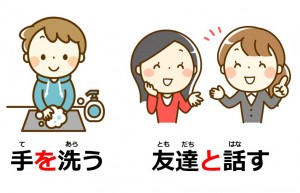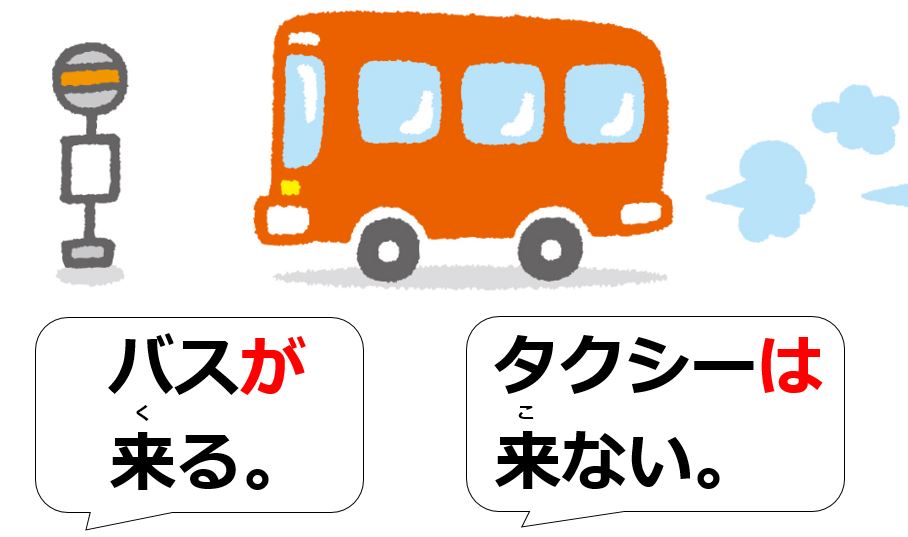Last time, you learned the basic knowledge of Japanese verbs such as what ru-verb and u-verbs are and how to conjugate them. In this lesson, you will learn how to use Japanese verbs in a sentence by using the particles: は and が.
Intransitive Verbs: How to Set a Subject with the Particle は and が
| Table of Contents What Is a Complete Sentence Like? The particle は VS. the Particle が How to Recognize the Function of は |
Like in English, there is another aspect of Japanese verbs: intransitive and transitive verbs. The difference is very simple in that it comes down to whether verbs have objects or not. For example, the sentence: “I’m running” doesn’t have an object and thus “run” is an intransitive verb. The sentence: “I will play baseball” has an object and thus “play” is a transitive verb. The concept is the same in Japanese. Now, we will show you how to make sentences with Japanese intransitive verbs.
What Is a Complete Sentence Like?
Since sentences without subjects are very common in Japanese, one verb can be a complete sentence when the context clearly tells who or what you’re referring to. Take a look at the following examples.
| 歩く / 歩きます。 [I will] walk. |
| 泳ぐ / 泳ぎます。 [I will] swim. |
| 動く / 動きます。 [I will] move. |
| 走る / 走ります。 [I will] run. |
| 寝る / 寝ます。 [I will] go to bed. |
| 起きる / 起きます。 [I will] get up. |
| 逃げる / 逃げます。 [I will] run away. |
| 勉強する / 勉強します。 [I will] study. |
| 来る / 来ます。 [I will] come. |
That’s easy, isn’t it? Do you remember how to conjugate them? Let’s make them the negative form as a review.
| 歩かない / 歩きません。 [I will] not walk. |
| 泳がない / 泳ぎません。 [I will] not swim. |
| 動かない / 動きません。 [I will] not move. |
| 走らない / 走りません。 [I will] not run. |
| 寝ない / 寝ません。 [I will] not go to bed. |
| 起きない / 起きません。 [I will] not get up. |
| 逃げない / 逃げません。 [I will] not run away. |
| 勉強しない / 勉強しません。 [I will] not study. |
| 来ない / 来ません。 [I will] not come. |
[adsense]
Note: Japanese Future Tense
Grammatically, Japanese uses the same form for the present and future tense. We indicate future actions or states using time expressions: 今晩 (this evening) 明日 (tomorrow), 来年 (next year), etc. Even if there is not a key phrase, the context tells the listener whether or not it is a routine action or future action. You will specifically learn this in the tense section later.
The Topic Particle は VS. the Particle が (Subjects of Predicate)
When the context is not clear enough to omit, you have to set a subject. However, since Japanese has two particles which can express subjects, learners often get confused with the usage.
Topics Can Only Be Made Using は
| 運動会は | 私 (は or が) | 走る / 走ります |
| Topic | Subject | Verb |
| Vocabulary – 運動会: Sports day, 私: I, 走る: to run | ||
First of all, let us clarify what we are discussing. Regarding the first は, it cannot be replaced with が because topics can only be made by using the topic particle は (and the particle も if there is a inclusion). Here, how to make subjects is the argument point.
Another Function of は Indicates Contrast
| 運動会は | 私は | 走る / 走ります |
| Topic | Subject (Contrast) | Verb |
| As for the sports day, I will run (but, someone won’t run.) | ||
As we explained in the previous article, the topic particle は should be used once in a sentence. Here, the second は doesn’t work as a topic marker, but indicates contrast. Suppose that you will run and your friend will swim in the sports day and your mother asks, “Will both you and your friend run in the sports day?” you should reply, “私は(走る / 走ります)。友達は (泳ぐ / 泳ぎます)” because it signifies a contrast between the people.
Another Function of が Indicates New Information
| 雨が | 降る / 降ります |
| Subject (New Information) | Verb |
| Lit. Rain will fall. *Said when you see very cloudy weather. |
|
Please imagine the following situation, you have opened a window and noticed it’s about to rain. The particle が is used to introduce such new information. Let’s take a similar example to the above. Suppose that you will run and your friend will swim in the sports day and your mother asks, “Will you swim in the sports day?” you should reply, “私は(泳がない / 泳ぎません)。友達が (泳ぐ / 泳ぎます)” because the topic, which the mother made, is 私 and she had never mentioned the friend, i.e. the friend is new information to her.
In short, using both the particles: は and が to set subjects are correct, but the nuance is different. You might not completely understand the nuance, but that’s all right. Most people are unable to do it at the beginning. As you encounter more Japanese expressions, you will be able to figure it out gradually. As of now, please just memorize how they are different.
More Examples
| 私は | 歩く / 歩きます |
| Subject (Contrast) | Verb |
| I will walk. *Said when someone asked “I will run. How about you? |
|
| 僕は | 勉強する / 勉強します |
| Subject (Contrast) | Verb |
| I will study. *Said when someone will hang out. |
|
| バスが | 来る / 来ます |
| Subject (New Information) | Verb |
| The bus will come. *Said when you have found the bus is coming. |
|
| 犬が | 逃げる / 逃げます |
| Subject (New Information) | Verb |
| The dog will run away. *Said when you have noticed the dog is about to run away. |
|
The functions of the particles are applicable when the predicate is a noun or an adjective. The following is a script of self-introduction.
| 私は | 田中です |
| Topic / Subject | Predicate |
| I’m Tanaka. *The は is as a topic marker. |
|
| サッカーが | 趣味です |
| Subject (New Information) | Predicate |
| Soccer is [my] hobby. *Soccer is new information to the listeners. |
|
| バスケットボールは | 趣味じゃありません |
| Subject (Contrast) | Predicate |
| Basketball is not [my] hobby. *This is a contrast between soccer and basketball. |
|
How to Recognize the Function of は between Topic and Contrast
The forms can be exactly the same. Thus, depending on the context or your intention, the particle は will express either topics or contrasts.
| 名字は鈴木 (だ / です)。 My family name is Suzuki. |
Suppose that your name is Ichiro Suzuki. And, if you reply to the following question with the above sentence: “Your name is Ichiro Tanaka, isn’t it?” the particle は will work to express the contrast like “The first name is correct, but the family name is wrong.” If you reply to the following question with the above sentence: “May I have your family name?” the particle は will work as a topic marker because you and he/she are talking while having the common topic: family name.
Summary
- There are intransitive and transitive verbs
- は can express contrast
- が can express new information
Again, you don’t have to understand the usage of は vs. が right now. Both of them are grammatically correct and so you can make a complete sentence with a verb now. As you proceed with your learning, you will be able to make your sentence sound more natural. Don’t be a perfectionist. Next, you will learn how to make objects of Japanese verbs.

Japanese Verbs: U-verbs, Ru-verbs and Conjugation

Objects of Japanese Verbs with Particles: を, に, and と



